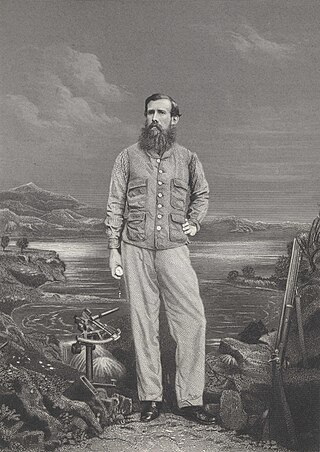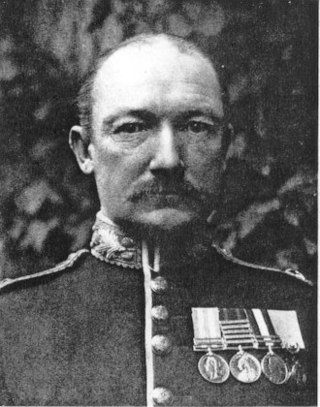
The Congo River, formerly also known as the Zaire River, is the second-longest river in Africa, shorter only than the Nile, as well as the third-largest river in the world by discharge volume, following the Amazon and Ganges rivers. It is the world's deepest recorded river, with measured depths of around 220 m (720 ft). The Congo-Lualaba-Chambeshi River system has an overall length of 4,700 km (2,900 mi), which makes it the world's ninth-longest river. The Chambeshi is a tributary of the Lualaba River, and Lualaba is the name of the Congo River upstream of Boyoma Falls, extending for 1,800 km (1,100 mi).

Sir Henry Morton Stanley was a Welsh-American explorer, journalist, soldier, colonial administrator, author and politician who was famous for his exploration of Central Africa and his search for missionary and explorer David Livingstone. Besides his discovery of Livingstone, he is mainly known for his search for the sources of the Nile and Congo rivers, the work he undertook as an agent of King Leopold II of the Belgians which enabled the occupation of the Congo Basin region, and his command of the Emin Pasha Relief Expedition. He was knighted in 1897, and served in Parliament as a Liberal Unionist member for Lambeth North from 1895 to 1900.

David Livingstone was a Scottish physician, Congregationalist, pioneer Christian missionary with the London Missionary Society, and an explorer in Africa. Livingstone was married to Mary Moffat Livingstone, from the prominent 18th-century Moffatt missionary family. Livingstone came to have a mythic status that operated on a number of interconnected levels: Protestant missionary martyr, working-class "rags-to-riches" inspirational story, scientific investigator and explorer, imperial reformer, anti-slavery crusader, and advocate of British commercial and colonial expansion. As a result, Livingstone became one of the most popular British heroes of the late 19th-century Victorian era.

Lieutenant-General Robert Stephenson Smyth Baden-Powell, 1st Baron Baden-Powell, was a British Army officer, writer, founder and first Chief Scout of the world-wide Scout Movement, and founder, with his sister Agnes, of the world-wide Girl Guide/Girl Scout Movement. Baden-Powell authored the first editions of the seminal work Scouting for Boys, which was an inspiration for the Scout Movement.

Sir Richard Francis Burton was a British explorer, writer, orientalist scholar, and soldier. He was famed for his travels and explorations in Asia, Africa, and the Americas, as well as his extraordinary knowledge of languages and cultures. According to one count, Burton spoke 29 languages.

Captain John Hanning Speke was an English explorer and officer in the British Indian Army who made three exploratory expeditions to Africa. He is most associated with the search for the source of the Nile and was the first European to reach Lake Victoria.

Mountains of the Moon is a legendary mountain or mountain range in east Africa at the source of the Nile River. Various identifications have been made in modern times, the Rwenzori Mountains of Uganda and the Democratic Republic of the Congo being the most celebrated.

The geography of North Africa has been reasonably well known among Europeans since classical antiquity in Greco-Roman geography. Northwest Africa was known as either Libya or Africa, while Egypt was considered part of Asia.

Baden-Powell is a 1989 biography of the 1st Baron Baden-Powell by Tim Jeal. Tim Jeal's work, researched over five years, was first published by Hutchinson in the UK and Yale University Press. It was reviewed by The New York Times. James Casada wrote in a review for Library Journal that it is "a balanced, definitive assessment which so far transcends previous treatments as to make them almost meaningless".
Kenneth McLaren DSO, (1860–1924) was a Major in the 13th Hussars regiment of the British Army. After his military service he assisted with the growth of the Scouting movement founded by his friend Robert Baden-Powell.

Nyangwe is a town on the right bank of the Lualaba River, in the Maniema Province in the east of the Democratic Republic of the Congo. In the second half of the 19th century, it was an important Swahili–Arab hub for trade goods like ivory, gold, iron and slaves, remaining one of the main slave trading centres until the Congo Arab war.
The Nile is a 2004 BBC Television documentary that tells the history and natural history of the Nile.

Scouting for Boys: A handbook for instruction in good citizenship is a book on Boy Scout training, published in various editions since 1908. Early editions were written and illustrated by Robert Baden-Powell with later editions being extensively rewritten by others. The book was originally a manual for self-instruction in observation, tracking and woodcraft skills as well as self-discipline and self-improvement, about the British Empire and duty as citizens with an eclectic mix of anecdotes and unabashed personal observations and recollections. It is pervaded by a degree of moral proselytizing and references to the author's own exploits. It is based on his boyhood experiences, his experience with the Mafeking Cadet Corps during the Second Boer War at the siege of Mafeking, and on his experimental camp on Brownsea Island, England.

Between 1874 and 1877 Henry Morton Stanley traveled Central Africa east to west, exploring Lake Victoria, Lake Tanganyika and the Lualaba and Congo rivers. He covered 7,000 miles (11,000 km) from Zanzibar in the east to Boma at the mouth of the Congo in the west. The expedition resolved several open questions concerning the geography of Central Africa, including identifying the source of the Nile, which he proved was not the Lualaba and is in fact the source of the Congo River.

Baden Fletcher Smyth Baden-Powell, was a military aviation pioneer, and President of the Royal Aeronautical Society from 1900 to 1907.

Sidi Mubarak Bombay, Mbarak Mombée , was a waYao explorer and guide, who participated in numerous expeditions by 19th century British explorers to East Africa.
Roy C Bridges was a noted historian the main focus of whose academic work was the British institutions and personnel which were established in East Africa in the middle years of the nineteenth century. He was Professor of History at the University of Aberdeen where he taught from 1964 to 1997. From 2002 to 2008 he was the President of the Hakluyt Society. He was also a Fellow of the Royal Geographical Society and the Royal Historical Society.
The Simiyu River is a river located in Simiyu Region and Arusha Region, Tanzania. It flows into Lake Victoria in the African Great Lakes region. As one of the six main inlets to Lake Victoria, it forms part of the upper headwaters of the Nile. The Simiyu Region is named after the river.
Eugène Maizan was a French Naval lieutenant and explorer, possibly the first European to penetrate East Africa and the first to enter tropical Africa from Zanzibar. In 1844-1845 Maizan reached as far as the district of Dege la Mhora, on the Uzaramo plateau about 80-150 kilometers from the coast, where he was seized by Zaramo tribesmen under Hembé, the son of Chief Mazungera, and bound to a calabash tree before being tortured, mutilated and murdered. Hembé amputated Maizan's limbs and sliced off his genitals while still alive before beheading him. Hembé later claimed to be acting on the orders of Arab ivory traders.

Edward James Glave was an English travel writer and journalist, known for his multiple expeditions in the Congo Free State















